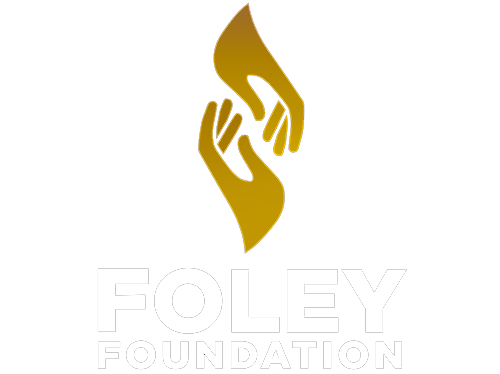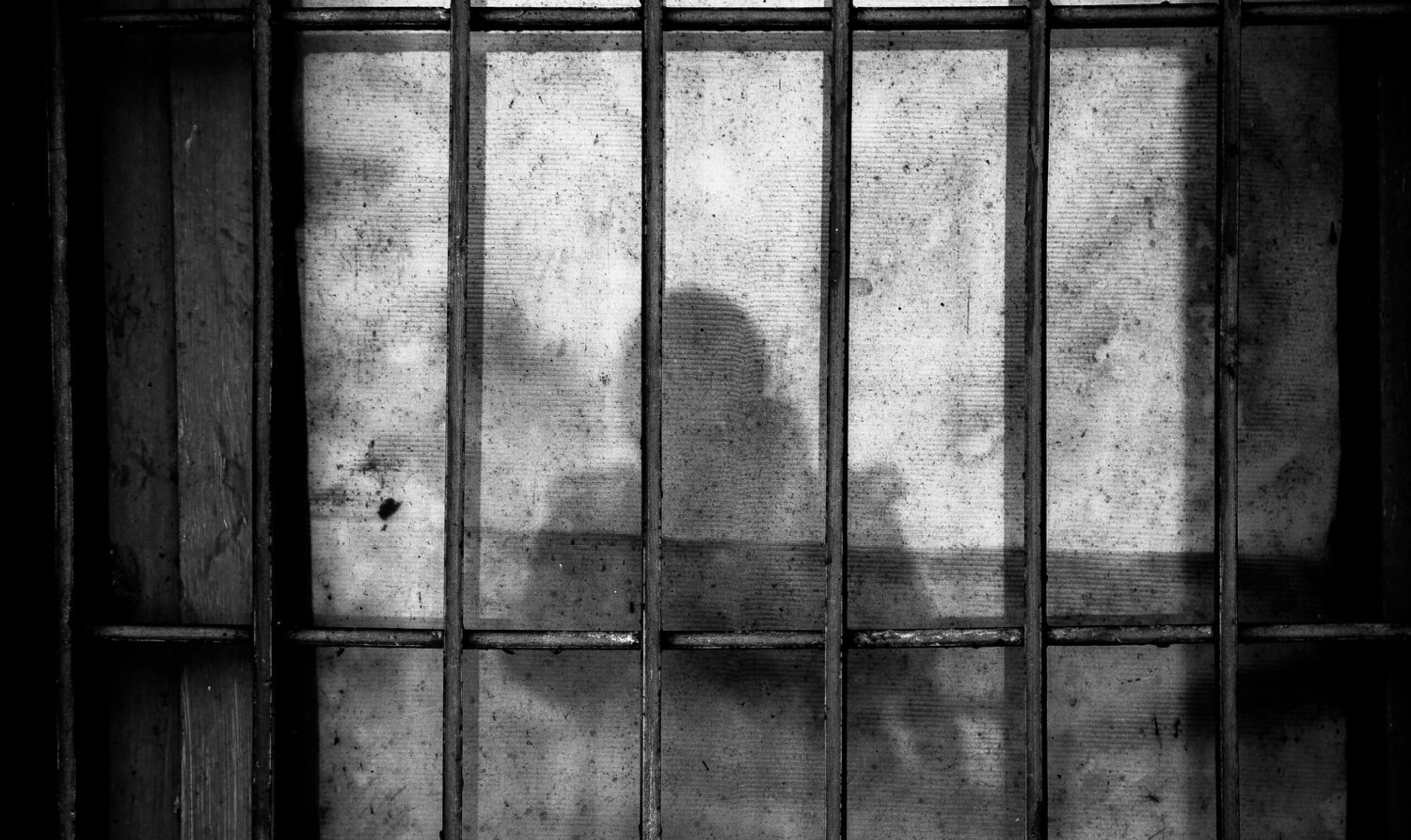recent Findings
Despite some success in freeing the wrongfully detained in 2024, there was little progress in freeing American hostages. In addition, statistical analysis of the data used for this report suggests that more Americans were wrongfully detained between 2015 and 2024 than in the 10 years prior (2005-2014).
54
At least 54 Americans were held hostage or wrongfully detained overseas during 2024
83%
Wrongful detention cases accounted for 83% of Americans held captive during 2024
17
17 Americans were released from captivity in 2024
6 years
Americans held captive at the end of 2024 had been detained, on average, just under 6 years
47%
Nearly half, 47%, of Americans freed from captivity in 2024 were released in a prisoner exchange
20 years
Reported incidents of Americans taken captive have significantly increased over the past 20 years
Executive Summary
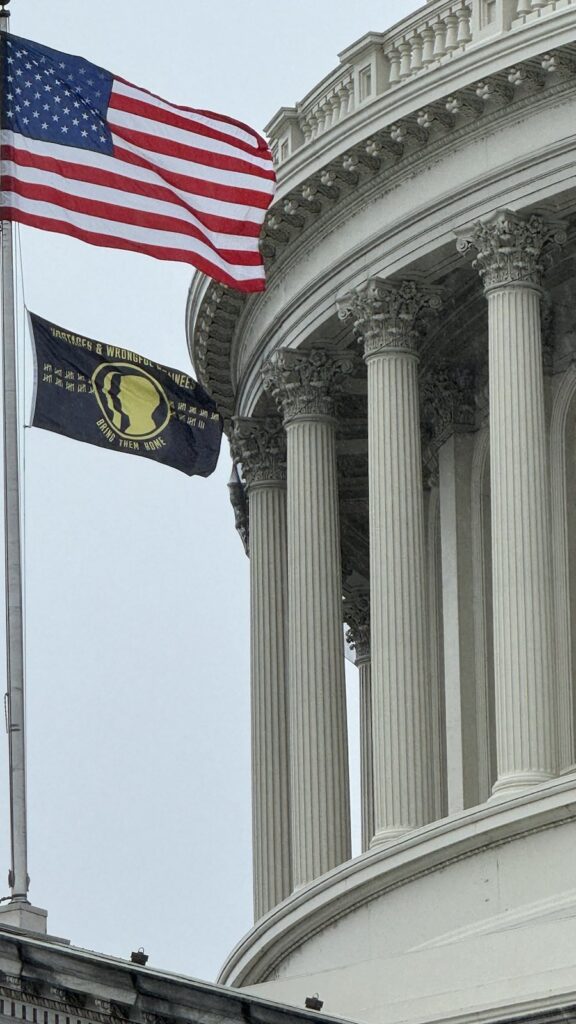
At one point in 2024, at least 54 Americans were held hostage or wrongfully detained overseas in 17 countries. The Foley Foundation assessed the majority of them (83%) as wrongfully detained. At least 17 Americans were released from captivity last year, the vast majority (47%) through prisoner exchanges.
Despite some success in freeing the wrongfully detained, there was little progress in freeing American hostages. In addition, statistical analysis of the data used for this report suggests that more Americans were wrongfully detained between 2015 and 2024 than in the 10 years prior (2005-2014). This finding may be due, in part, to the establishment of specific criteria for “wrongful detention,” a legal term defined by the Robert Levinson Hostage Recovery and Hostage-Taking Accountability Act (Levinson Act) that was signed into law at the end of 2020. Additionally, with several high-profile cases of wrongful detention by state actors, there has been greater media attention paid to the issue, more public reporting and hence, an enhanced ability through open-source research to track how many Americans may be held captive by nation states.
Measuring the full extent of U.S. hostage taking and wrongful detention abroad is challenging because of the lack of official metrics and often limited publicly available information. Variations in definitions, criteria, and terminology employed by nations and media organizations globally also create confusion, which has led to differing numbers and lists (a). These challenges highlight the need for transparent, official metrics and consistent, unambiguous terms to understand the problem, coordinate international responses, and implement effective deterrence and prevention strategies. Finally, as the nature of the threat has shifted from hostage-taking toward wrongful detention, a focused, whole of government study is warranted to develop a proactive national strategy and a comprehensive set of policies, tools, and capabilities to address this dynamic national security threat.
(a) The United States is the only nation that uses the term “wrongful detention” in these cases with most international organizations and nations using the term “arbitrary detention” instead.
A NOTE FROM our PRESIDENT AND FOUNDER
OUR NATION MUST SUMMON THE MORAL COURAGE AND MARSHAL THE RESOLVE NECESSARY TO NOT ONLY BRING INNOCENT AMERICANS HOME, BUT TO ALSO DETER AND PREVENT THE ODIOUS PRACTICE OF HOSTAGE-TAKING

Dear interested fellow Americans,
When the U.S. government failed to save American journalists James Foley, Steven Sotloff, and aid workers, Kayla Mueller and Peter Kassig, from captivity by ISIS in 2014, I established the James W. Foley Legacy Foundation because I knew the United States of America could do better by our fellow citizens.
For the past decade, the Foley Foundation has advocated for the freedom of all U.S. nationals taken hostage or wrongfully detained abroad and has conducted research to ensure that U.S. policy protects Americans abroad. We have sought to hold our government accountable for addressing this national security threat through groundbreaking qualitative research involving families of Americans held captive abroad, returned hostages, government officials, and experts from outside of government. We believe our nonpartisan, independent research is critical for policymakers and the American people to understand the threat posed by international hostage-taking, especially because our government does not publish official metrics.
This first report in our Bringing Americans Home research series for 2025 is a quantitative analysis of the hostage taking and wrongful detainee landscape as it was at the end of 2024 including how the landscape has evolved since 2005. Alarmingly, this analysis reveals that the threat of international abductions continues to grow, particularly the risk of wrongful detention.
The “U.S. hostage enterprise,” as it is informally called, was built to recover U.S. nationals taken hostage abroad. It was neither designed to recover those wrongfully detained by nation states (who now hold the vast majority of Americans held captive) nor to deter or prevent adversaries from taking our people.
I commend the U.S. government for bringing home over 145 U.S. nationals from captivity since 2015. Our nation must, however, summon the moral courage and marshal the resolve necessary to not only bring innocent Americans home, but to also deter and prevent the odious practice of hostage-taking.
Respectfully yours,


Diane Foley
President & Founder

Download Reports
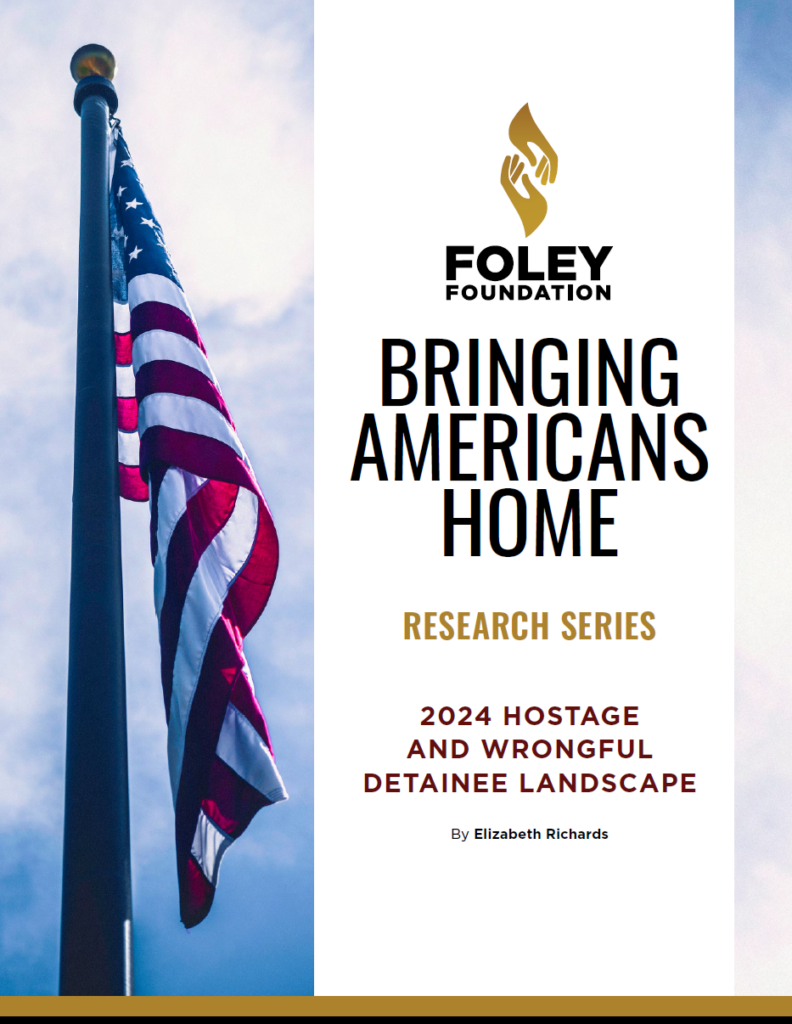
Latest Statistical Report
Bringing Americans Home
Bringing Americans Home: 2024
This report, conducted by the Foley Foundation, builds upon the Foundation’s previous assessments of the effectiveness of the 2015 U.S. Hostage Policy Review, the implementation of Presidential Policy Directive 30, Executive Order 13698, Executive Order 14078, and the Robert Levinson Hostage Recovery and Hostage-Taking Accountability Act. It integrates an examination of the landscape of hostage-takings and wrongful detentions of U.S. nationals using the Foley Foundation’s database of cases with a survey of family members and other stakeholders connected to 27 cases of hostages and wrongful detainees. Through confidential interviews with 62 participants, this report represents the perspectives of these U.S. hostages, wrongfully held detainees, their families, representatives, and advocates.
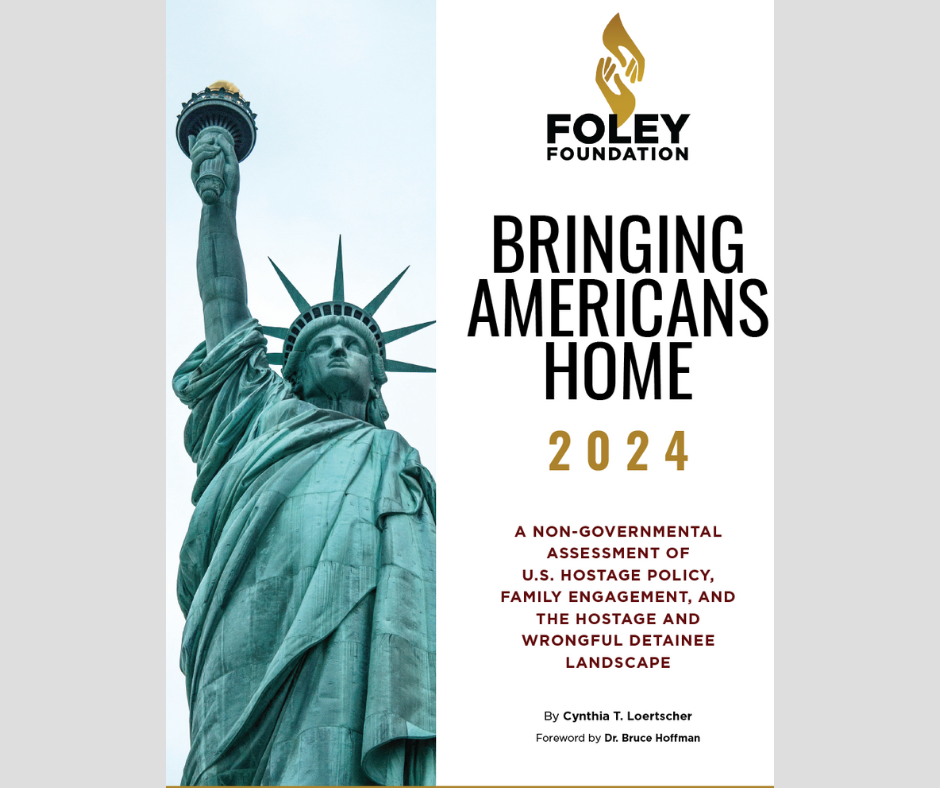
Bringing Americans Home: 2023
This report, conducted by the James W. Foley Legacy Foundation (JWFLF), consists of two sections.. The first section, “U.S. National Wrongful Detention and Hostage-Taking Landscape, 2022-2023,” used two JWFLF datasets containing information on 422 U.S. nationals held hostage or wrongfully detained abroad from January 1, 2001, through July 31, 2023, to discuss trends, releases, and detailed outcomes. The second section, “Wrongful Detainee and Hostage Perspectives,” was written by Matthew Heath and Jeffery Woodke, two former captives. Both perspectives provide ways to rethink U.S. strategy on wrongful detentions and hostage-takings. Their stories help to shed light on the toll of captivities and the importance of securing the freedom of all Americans.

Bringing Americans Home: 2022
From 2019–2021, the James W. Foley Legacy Foundation published a yearly assessment of the efficacy of the 2015 U.S. Hostage Policy Review and the implementation of PPD-30 and EO 13698. This report, an extension of those assessments, continues to examine how the U.S. government creates and implements policy in support of U.S. nationals taken hostage or wrongfully detained abroad as well as their families. Most importantly, this report seeks to better understand whether the new structures these policy changes have created help bring Americans home and offers nine recommendations to improve the government’s hostage enterprise.

Bringing Americans Home: 2021
This report, conducted by the James W. Foley Legacy Foundation (JWFLF), is a continuation of JWFLF’s assessments of the efficacy of the 2015 U.S. Hostage Policy Review and the implementation of Presidential Policy Directive 30 and Executive Order 13698. This study seeks to convey the perspectives of U.S. hostages, unlawfully or wrongfully held detainees, their family members, representatives, advocates, former senior military officials, and current and former U.S. officials. It, however, does not represent the perspectives of all former hostages, detainees, and their families, but only presents the perspectives of those who participated in this study

Bringing Americans Home: 2020
This report, conducted by the James W. Foley Legacy Foundation (JWFLF), is a continuation of JWFLF’s initial assessment of the efficacy of the 2015 U.S. Hostage Policy Review and the implementation of PPD-30 and EO 13698. This study was conducted from the perspective of American hostages, wrongfully held detainees, and their family members and representatives. It does not represent the perspective of all former hostages, detainees, and their families, but only presents the perspectives of those who participated in this study.
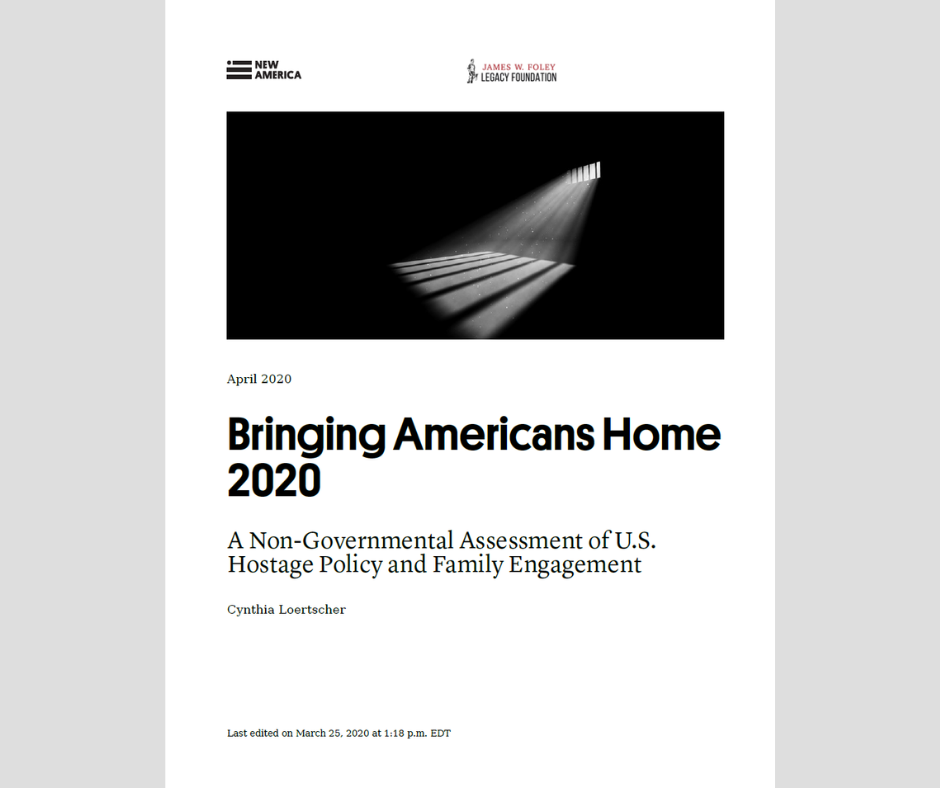
Bringing Americans Home: 2019
This assessment, conducted by the James W. Foley Legacy Foundation, (JWFLF) is the first non-governmental review of the efficacy of the 2015 U.S. Hostage Policy Review and the implementation of Presidential Policy Directive 30 (PPD-30) and Executive Order 13698 (EO 13698) concerning hostage recovery activities. This study was conducted from the perspective of former American hostages, family members of current and former U.S. hostages, and others detained unlawfully or wrongfully by a foreign government. This study does not represent the perspective of all former hostages, detainees, and their families, but only presents the perspectives of those who participated in this study.

